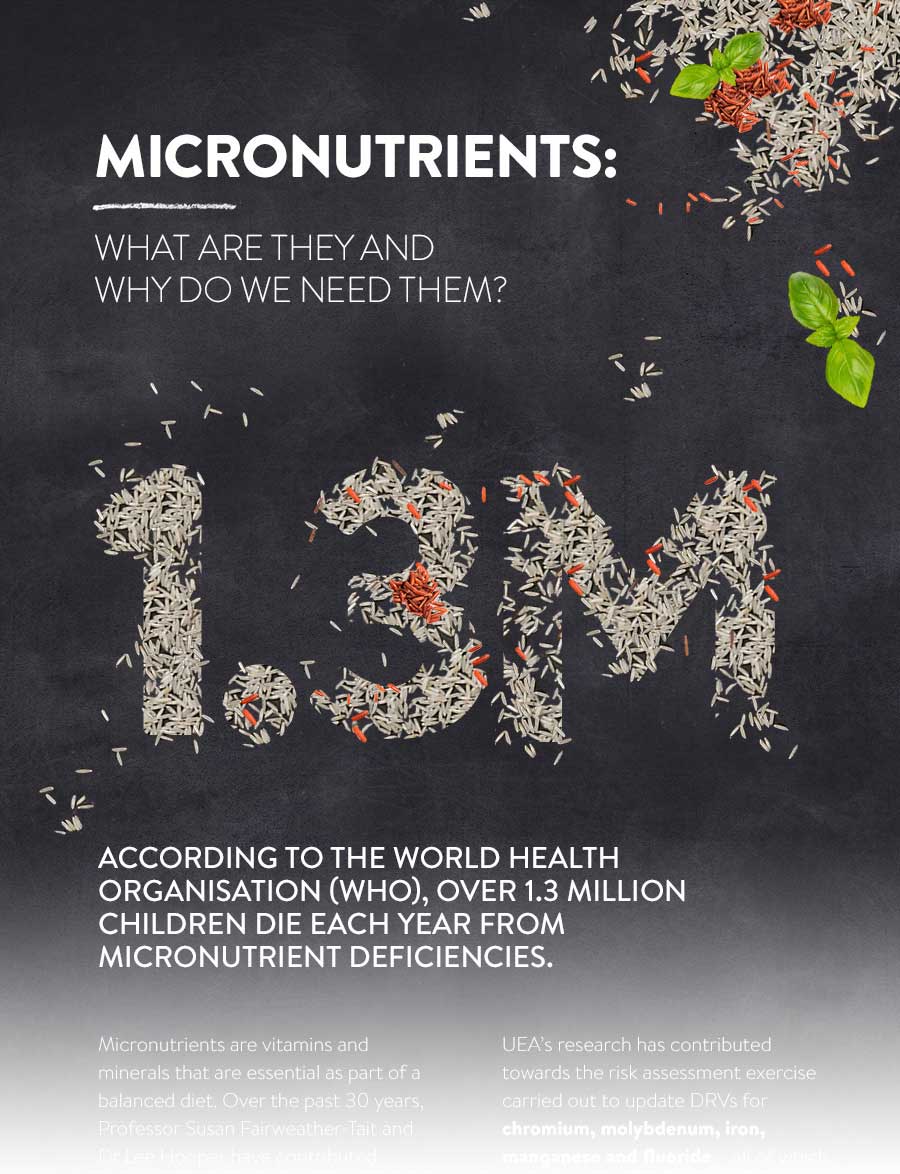)


Micronutrients are vitamins and minerals that are essential, as part of a balanced diet, for a wide range of metabolic and other functions. Although a micronutrient deficiency can be life threatening, exceeding the recommended intake for long periods of time also has adverse effects on health.
Over the past 30 years, Professor Susan Fairweather-Tait and Dr Lee Hooper have contributed significantly within the field, and they are currently participating in projects to learn more about micronutrients and the role they play throughout the world. Professor Fairweather-Tait is a member of European Food Safety Authority (EFSA) creating European Dietary Reference Values (DRVs) for micronutrients and has been involved in systematic reviews underpinning the evidence for these opinions. Dr Hooper is a member of the WHO Nutrition Guidance Expert Advisory Group (NUGAG) developing World Health Organisation (WHO) guidance on potassium and sodium and was an author of the underpinning systematic reviews commissioned to assess the evidence.
According to the WHO, over 1.3 million children die each year from micronutrient deficiencies and, throughout the world, DRVs for micronutrients vary considerably - partly due to differences in dietary composition and other factors that may affect bioavailability. An understanding of the effects of differences in bioavailability on DRVs is pivotal, and important research has been undertaken to generate the information needed to establish the dietary requirements for different population groups.
Click on image to see full infographic:


UEA committed to a research programme that aimed to improve existing knowledge on micronutrient intake, bioavailability and the relationship between various health issues. Part of this research was funded by the European Micronutrient Recommendations Aligned (EURRECA) Network of Excellence in which a number of scientific tools were developed that would help harmonise European micronutrient recommendations. In particular, a novel approach was developed and used by EFSA for converting physiological requirements into dietary intakes in order to set DRVs for iron:
“Dietary iron absorption was estimated from a probability model, based on measures of iron intake and status in a representative group of men and women from the UK National Diet and Nutrition Survey.”
Through meta-analyses and systematic reviews, Professor Fairweather-Tait and Dr Hooper have since been able to assess the effects that certain micronutrients have on particular health issues. Because of this, WHO and EFSA have been able to update its guidelines for adults and children, and clarity has been achieved.
UEA's research has contributed towards the risk assessment exercise carried out to update DRVs for chromium, molybdenum, manganese and fluoride – all of which have since been published by the EFSA.
UEA has also been involved in systematic reviews underpinning WHO guidance on potassium and sodium. The systematic reviews concluded that an increase in potassium and a reduction in sodium reduced the health risks associated with blood pressure and stroke, and supported development of the WHO guidance and DRVs produced by EFSA.
In terms of future projects, a study is currently underway in which the bioavailability and speciation of iron in plant foods is being characterised in order to help improve the supply of iron in the UK population – a study that has been conducted in response to the recommendations for reduced meat consumption (<70g/d). A new JPI project, funded in the UK by the MRC, has recently started, which aims to understand the role that selenium plays in neurodevelopment.
While the world cannot escape the potential crisis associated with micronutrient deficiency today, by 2050 it is hoped that nutritious food can be supplied in a sustainable way. Helping to deliver this goal is HarvestPlus – an organisation to which Professor Fairweather-Tait has links – is developing an international biofortification programme for developing countries via the breeding of micronutrient-dense staple food crops.
UEA's research has made a significant contribution to the gaps in knowledge that still surround the field of micronutrient requirements. The work of Professor Fairweather-Tait and Dr Hooper continues to help clarify some of the links between micronutrients and human health.